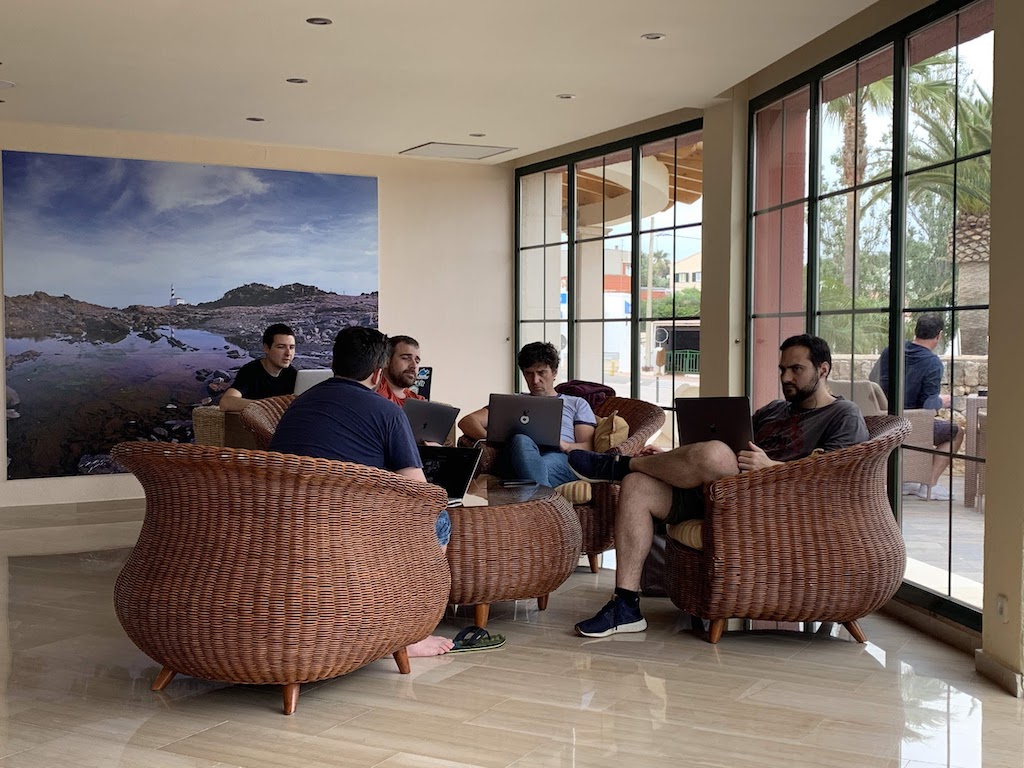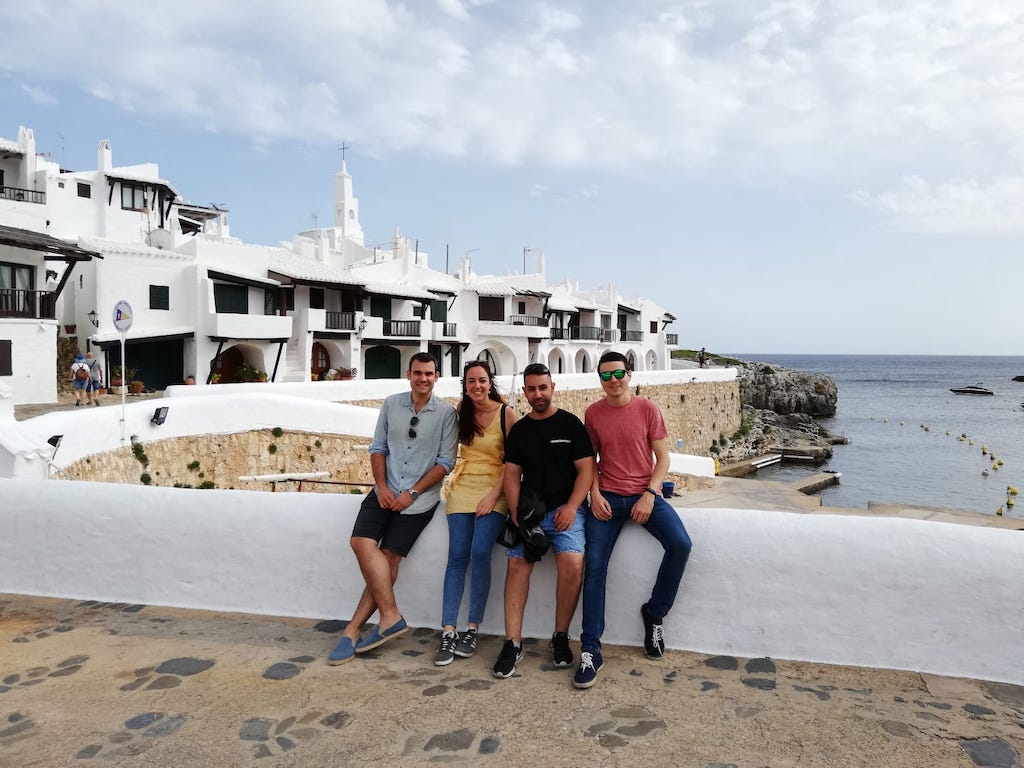How we organise our company retreats
Diario del capitán, fecha estelar d358.y38/AB

Company get-togethers are paramount to running healthy all-remote companies. In this blog post, we will share everything we know so you can organise yours!
Running a 100%-distributed team definitely has got a lot of advantages, but it comes with several challenges as well. One of the main challenges is that it takes longer (and more effort) to make your team members bond with one another, as they don't get to meet face to face too often.
We have been running our remote development consultancy since its inception and have grown it to a dozen full-time members now. Some are based in Barcelona, where we're originally from, and some are scattered around Spain.
As the team grew, we started meeting more often so we could spend more time together in and out of work in our bi-monthly Martian Days (a company get-together where we do hands-on sessions with the founders, keynotes about new technologies or findings, share the projects we're working on, or workshops, just to name a few of the things we do) and also in our annual company retreat.
In 2017, we spent some quality time in Tenerife, the Canary Islands, and last year, we went to Dublin for our company retreat. This year, we decided to spend some days in sunny Menorca.
Even though we do them in early summer, company retreats are the culmination of the year, where we travel together to spend some days as a team.
In our company retreats, we allow some space for work and some for leisure. How? Read on!
Our idea of a company retreat is to get away from our daily routine in a different environment where we can work on exceptional projects and spend some time off bonding as a team. That's why we like to travel a bit to see something different, and we get either a big apartment or a hotel, to stay all in the same place.
Every year, we decide the next company retreat in the Christmas get-together. Several options are presented by the company members, with a few slides including the overview of the plan and logistics and a brief explanation of why we should go there, and then we vote to choose our next destination.
In our first two years, we rented big Airbnbs to stay all in the same house. In Tenerife, we could all fit in one Airbnb, but in Dublin, we couldn't find any house big enough inside the city, so we had to split into two houses.
Airbnbs might have certain advantages, but in hindsight, we spent too much time doing groceries, cooking meals and doing chores, and we felt like we could've used that time more wisely.

That's why we decided to go to a hotel this year: each one gets a separate room, meals are prepared and served in the same hotel facilities and the cleaning gets taken care of by the hotel staff. We wanted to make the most out of the time we had together, and in hindsight, I think we succeeded in it. Also, hotels have got meeting rooms and more work-friendly environments than most Airbnbs, not to speak about other facilities like a gym, swimming pool or even saunas and spas.
Early summer is the best time of the year to organise them: all clients start to wind down and some of them reduce our workload for the summer months. Also, we do them before anyone leaves for holidays, so we can maximise the number of people attending.
For small companies like ours, it might look easy to coordinate 12 agendas and find a time that works for everyone, but it's not! Each of us has a different reality back home, so we can't force anyone to join for the entire length of the retreat.
We usually try to have everyone there on Thursday and Friday, where the most critical things happen (more details on the next subsection) while the luckier ones get to stay the entire weekend in more relaxed and leisure-oriented activities.
As I mentioned, we like to combine both work and leisure in our company retreats. This way, we can get to know each other in working and relaxed environments equally.
In this year's edition, we all flew into Menorca on Thursday morning. We spent a big chunk of the day doing our Martian Day, where we presented our results, reviewed our goals, shared financials with the rest of the team, introduced new tools & ways to work and finally we shared a more casual presentation about the five years of the company. For that, we rented a meetings room in the hotel, so we could have a projector and our own bit of intimacy in a room of our own.
After the working part of the day, we took a trip around the island in a mini-bus and wrapped up the day by eating really fresh local food at Es Cranc restaurant. Extremely recommended place, if you ever travel to Menorca!
On Friday, we also split the day in two. First, we worked on our internal product in a sort of hackathon we call Zerg Rush. We usually do the Zerg Rushes every two months and 100% online, but it felt good to do one in-person for a change.
For this occasion, we didn't get a meetings room because we thought it'd be cool to work on this in a more casual environment: from the cafeteria, by the pool, in a hammock or wherever each of us wanted to work from, but the general consensus, afterwards, was that it felt difficult to concentrate in these environments, and not everyone could work at their full potential.

On Friday afternoon, we went to visit the beautiful city of Maó as the after-work activity, before we visited the stunning Coves d'en Xoroi to get a drink in a truly exceptional bar, watching the sunset.
Some people left on Friday evening and that's where the real fun began so not everyone in the company could enjoy a weekend in Menorca with the rest of their workmates, but those who did, spent more quality time together by going to the beach, chilling by the pool in the hotel or walking around discovering the local food, drinks and other parts of town.
In a nutshell, we like to combine a bit of working with some afterwork activities to have a balanced schedule, never packing it too much to avoid stress.
Since most of our team members have got families, we don't want to force anyone to travel too far or to spend too many days away from home. That's why we tend to choose destinations one or two hours away by plane. This way, we reduce travel time, and the cost of travelling (in logistics, time and budget) befits the intention of the retreat.
We also meet a few times during the year, thanks to our bi-monthly Martian Days, therefore we don't need to spend fifteen days or longer together.
Other remote working companies never meet during the year, and meet only during their annual company retreat. Therefore, they usually spend a couple of weeks together to compensate for meeting just once per year. Different styles for different kinds of companies! Choose your flavour!
Also, look at this panoramic view of the Menorca coast!

In order to organise a successful company retreat, you need to do it with plenty of time. Booking flights & hotel with enough time will get you better deals, and each team member can coordinate with their respective families at home.
It's also recommendable to have one person leading the organisation of your company retreat. While many people can contribute to it - and we do like to open up the plan for suggestions and voting which activities we want to do - one person must take the lead and make it happen, being accountable for it and booking everything that's needed in due time.
When flying from different airports, it might be tricky to coordinate the landing times of every company member. It definitely pays off to group people together to avoid dispersion and to avoid the feeling of travelling alone, when possible. For instance, even if I prefer going to Menorca by boat, I decided to join the rest of the Barcelona crew. This way, we had an early start all together, shared a cab with a few of them, got a group breakfast in the airport and even played Nintendo Switch to kill time while waiting to board and take off.
Last, but not least: payments. Because we cover all expenses during the trip, it is very useful to centralise all the payments in one or two people. This way, it's easier to group all the receipts to send them all at once to bookkeeping and do the accounting and reimbursements afterwards.
I can't simply conceive running MarsBased, or any other remote company per se, without regular get-togethers, and much less without an annual company retreat. The benefits of these activities far outweigh the disadvantages.
The moment we wrap up a company retreat, I start thinking about and looking forward to the next one. Hands down, one of my favourite weeks of the year.

As remote teams become more and more prevalent how can you build community among your distributed workforce?
Leer el artículo
Memories from our second company retreat. This time, we went to Dublin to enjoy some time together & visit a new country.
Leer el artículo
Maintaining a strong company culture can be tricky, but it's trickier in distributed teams and all-remote companies. In this post, we discuss how we do it in our officeless development consultancy.
Leer el artículo